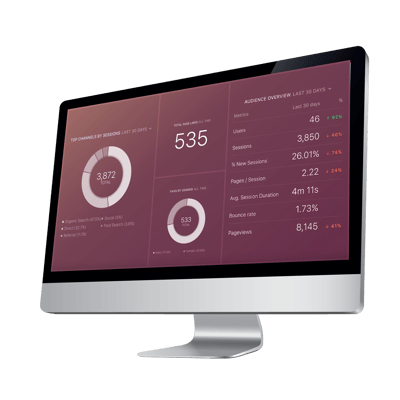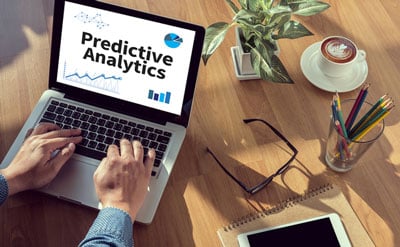 There was a time when a digital marketing team was considered avant-garde if it could define the costs of paid traffic versus organic traffic. Nowadays, understanding your traffic sources is child’s play. If your team can’t define how and when traffic originates, then you’re dead in the water. Much more is needed.
There was a time when a digital marketing team was considered avant-garde if it could define the costs of paid traffic versus organic traffic. Nowadays, understanding your traffic sources is child’s play. If your team can’t define how and when traffic originates, then you’re dead in the water. Much more is needed.
Successful digital marketing is no longer about having a high PageRank and sitting back while the inbound leads pile up. There’s too much competition. There are too many companies using the right approaches. Your company must incorporate a multi-faceted approach, one where you embrace a personalized inbound marketing strategy that reaches your customers no matter where they are or what they’re doing. Here are some rules to live by.
Adopt a Big Data Marketing Mindset
You can gather all kinds of data and get nowhere if you don’t have the tools or the knowledge to leverage that data properly. Filling out an excel sheet of customer data won’t help if you can’t put it to use. In fact, it’s a waste of time as the influx of real-time data is virtually impossible to manage with manual processes. Extrapolating, disseminating and enriching that data with the right data enrichment software is critical. The idea is to isolate the data that matters most to your audience and your company. That comes from understanding which data to retain and which data to discard.
None of this is possible if your digital marketing team doesn’t have the right data enrichment tool. Embracing big data means increasing your interactions with customers along their journey. It means mapping out how an interested prospect becomes a lead and how that lead is supported by your digital marketing team. Increase the number of touch-points along your customer’s journey and you’ll be better positioned to identify the specific data points that matter most.
Using the Right Technologies
 So, how do you ensure your inbound marketing strategy is continually feeding you with up-to-the-minute information?
So, how do you ensure your inbound marketing strategy is continually feeding you with up-to-the-minute information?
First, be willing to investigate emerging technologies. Online searches with Smartphones and mobile handheld comput
ers surpassed laptop searches years ago. A mobile-friendly website is an absolute must in today’s economy. If you don’t have a mobile-capable website, then you’re ignoring a large portion of your market, a portion your competitors are taking full advantage of.
Second, match your technology to your audience. A perfect example is employing a messaging app or live chat for a constantly moving customer base. Being accessible for customers on the go through a customer-friendly app helps you gather more data while solidifying your brand. It’s all about increasing customer engagement. The more accessible you are, the more engaged your customer base and the more data you can leverage to win more business. It’s all part of your overall strategy to increase the number of touch-points and interactions with your customers.
Third, don’t ignore the proven performers. The right email marketing strategy can make all the difference. A video-sharing platform like YouTube is a great source of leads. The right social media forum can put you one-step closer to your audience. Webcasts and podcasts allow you to showcase your knowledge to a broad audience while providing your customers with a platform to ask direct questions.
Adopting a Predictive Analytics Model
You know what your customers like and don’t like. You also know that once they get past a certain point that the odds of them buying increases. Unfortunately, not every customer follows a linear path. Not every customer takes the same step-by-step process to make a purchase.
You may know what a customer will do once they get to that final step, but do you know the likelihood of them progressing from one step to another based on the actions they take? Do you know why, how, and when that customer moved from one step to the next? Do you know why some customers always seem to move quickly through each of these steps, while others seem to be stuck in the mud? This is where predictive analytics come in.
With predictive analytics, you’re better able to anticipate the different actions each of your customers will take on their way to making a purchase. If your digital marketing team can use historical customer actions to predict future customer actions, then you’re fully embracing the predictive analytics model.
A perfect example of predictive analytics in use would include the time a customer spends on a given landing page. The longer they spend on that page, the more likely they buy. That likelihood increases if they download a free brochure, it increases again if they watch your corporate video, and it increases even further if they fill out your lead capture form. Now, if you manipulate the placement of these visual prompts, you might just be able to influence these actions.

Personalizing Your Marketing Message
Again, different customers have different journeys which is why having separate strategies for each of your buyer personas is so important. These buyer personas need different types of information. They provide different kinds of data and they require a different analytics approach. Understanding each of your buyer personas is the first step. Mapping out their journey is the next and personalizing your message is the last.
Personalizing your marketing message is the holy grail of digital marketing. The more personalized your message, the more you’re able to guide your customer along their journey and influence the decisions they make. That means having a customized content marketing strategy, a separate email marketing approach and specific landing pages and social media channels that tailor to the concerns and needs of each of these buyer personas. In turn, the data that each provide allows you to further improve your inbound marketing strategy.
The days of running a random digital advertising campaign and relying upon re-purposed content are long gone. The best digital marketing teams define their buyer personas, map out their buyer's journey, welcome real-time data and use that data in a predictive analytics model that helps them to influence future customer actions.
If you need an inbound marketing agency capable of implementing a customer-focused marketing strategy, then contact us and request an assessment.
Written By: Doug Milnor


